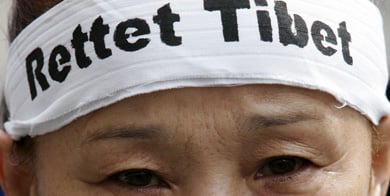Amid the outrage over the brutality of the Chinese authorities in Tibet, the question arises: What can be done about it? Can these crimes be stopped? It’s hard to bear such feelings of helplessness while people are being beaten down simply because they want freedom of expression. But China doesn’t have to remain the untouchable power that Beijing likes to present itself as – especially not in the run-up to the Olympics this summer.
The Chinese leadership considers the Summer Games a prestigious public relations project, and its success depends on the international response to the current situation. China wants to present itself as a modern and open society to the rest of the world. As such, there is a conflict between China’s ambitions and the claims of the International Olympic Committee (IOC) that sports and politics must not be connected. The economic implications of the Games are also immense – they will end up costing $40 billion (€26 billion). But when a country that walks all over human rights hosts the Games, the Olympic movement is betraying its own fundamental principles calling for peaceful cooperation and an end to racism.
Going by such criteria there is no basis for the Beijing Games, and many human rights organizations are demanding they be cancelled, or, at the very least, are calling for the opening ceremonies to be boycotted. Even that would be a huge loss of face likely to influence the communist leadership – although Beijing would naturally never admit it publicly.
Whether to boycott or not is up to the IOC to decide. However, each individual in Germany can do his or her part to influence that choice. Signing petitions, going to rallies and attending protests all gain importance when more people take part. There are rallies in front of the Chinese Embassy in Berlin several times a week, but there are events taking place across Germany right now. There are gatherings in front of Chinese consulates and concerned people from Germany are heading to the ICO headquarters in Lausanne to make sure those responsible for the crimes in Tibet realize they will not be soon forgotten.
Chancellor Angela Merkel has shown her sympathies for Tibet’s situation in recent months, which is why TID expects the German government not to limit itself to official appeals to China. Berlin must also put economic pressure on Beijing. The decision to suspend talks for development aid was an important first step. However, appropriate further signals to China would include an invitation from Chancellor Merkel to meet the Dalai Lama again or a boycott of the Olympics’ opening ceremonies by Germany this summer.
Klemens Ludwig is a member of Tibet Initiative Deutschland. His biography of the Dalai Lama was recently published in German by Verlag C. H. Beck. Translation by The Local.



 Please whitelist us to continue reading.
Please whitelist us to continue reading.